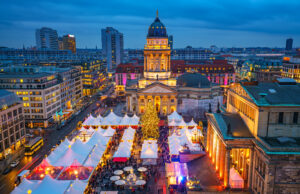Besides great sights, an interesting history and many exciting destinations, Chester has a lot more to offer. Here you will find many helpful tips to enjoy your vacation in Chester.
Here you can find hotels in the area of Chester
Just type in your destination and get many different suggestions.
Sights in Chester
There’s a lot to see in the city of Chester. This walled, historic city boasts a Norman castle, a medieval cathedral, an amphitheatre and much more. Plus, with its convenient location in the North West of England, Chester makes for a great base to explore the rest of the region.
Chester Castle
A visit to Chester wouldn’t be complete without seeing Chester Castle. This imposing Norman structure was built in 1071, just two years after the Battle of Hastings. The castle has been home to royalty, played a role in the English Civil War and even served as a prison. Today, it’s open to the public and houses a museum, café and art gallery.
The Cathedral
The Cathedral Church of Christ and the Blessed Virgin Mary, to give it its full name, is definitely worth a visit. This Gothic cathedral dates back to the 13th century and, with its crooked spire, is one of Chester’s most distinctive landmarks. Take a tour of the inside to learn about its fascinating history and see the incredibly wellpreserved Medieval musicians’ stalls.
Chester Amphitheatre
For something a little bit different, head to Chester Amphitheatre. This is one of the bestpreserved Roman ruins in Britain and is thought to date back to the 1st century AD. It was used for a variety of entertainment including gladiatorial fights, animal hunts and public executions! Today, it’s a popular spot for picnics and summer events.
The Rows
No visit to Chester would be complete without spending some time exploring The Rows. These unique, covered walkways on the first and second floors of Chester’s buildings are thought to be the oldest shopping arcades in Britain. today, they’re lined with independent shops, cafés and restaurants, making them the perfect place to while away a few hours.
Chester Racecourse
If you’re visiting Chester in May, make sure to check out the city’s racecourse. This picturesque course dates back to the early 16th century and hosts a number of highprofile horse races throughout the year, including the Chester Cup which is run in May. Even if you’re not interested in horse racing, it’s worth a visit for the stunning views across Chester.
So, those are just a few of the sights that Chester has to offer. Whether you’re interested in history, architecture or just want to enjoy a relaxed afternoon strolling around unique shops, Chester is the perfect destination.
History of Chester
Chester is a historic city in Cheshire, England, on the River Dee, close to the border with Wales. Chester was founded as a “castrum” or Roman fort with the name Deva Victrix in the reign of the Emperor Vespasian in 79 AD. One of the main legacies of the Roman period is the city’s defensive walls, built in stone and still largely intact, which date from the 2nd century.
The Romans left Britain in 410 AD and, although Chester was taken by the Saxons in the 6th century, it seems that they had little impact on the existing city other than replacing the original wooden bridge crossing the River Dee with a stone one.
The history of Chester is traditionally said to have begun with the foundation of a missi dominici or monastery by Saint Werburgh in 675. Her Abbey Churches at Chester and elsewhere, together with the Minster (or Cathedral) which she also established, were central to the religious and spiritual life of the city for centuries to come.
The first Saxon King of Mercia, Wulfhere, granted land in Chester to Earl Roderic in 673. From this time on the history of Chester is inextricably linked with the Earldom of Chester, later becoming the County Palatine of Chester. The city’s strategic location meant that it enjoyed a high degree of political and economic importance during the medieval period, and its fine architecture reflects this.
The city was captured by the Danes in 894 but soon regained by the Saxons. In the battle of Brunanburh in 937, the Saxon King Athelstan finally vanquished the combined forces of the Scots, Welsh and Norsemen who had been harrying England’s northern and western borders.
The early 11th century saw the construction of Chester Castle, originally on a motteandbailey model but later rebuilt in stone. The present daykeep dates from around 1245. In 1071 Chester came within the ambit of the new Shire of Cheshire, established by the Normans.
In the centuries following the Norman Conquest, Chester grew in prosperity as a market town and an important staging post on the LondonChesterLiverpool route. Its status as a county palatine, however, meant that it was also subject to a considerable degree of selfgovernment, which at times made for a somewhat turbulent history.
The medieval city walls enclosed a area of just over 1 square mile. Within the walls, the ground was uneven and much of it marshy, with the River Dee and its tributaries running through the centre. Despite this, Chester was an important commercial centre, with a port and market, and industries such as textile production, metalworking and tanning.
The 14th century saw the construction of Chester’s iconic Eastgate clock, believed to be the oldest working clock in the world. The city was also home to a notable group of medieval polymaths known as the Fourteenth Century Four treasures: Chaucer, Gower, Wyclif and Langland.
The outbreak of the Wars of the Roses in 1455 divided the city, as it did the country, between the houses of York and Lancaster. Chester was captured by the Lancastrians in 1471 but regained by the Yorkists the following year.
The Tudor period was a time of relative peace and prosperity for Chester, although the city was hit hard by the plague in 1593. In 1603 James I, the first Stuart king, visited Chester and was greeted by crowds of cheering citizens.
The Civil War of the 1640s left Chester on the side of the parliamentarians. The city was besieged by royalist troops in 1645 but held out until the Parliamentarians relief arrived the following year.
The 18th century saw Chester’s importance as a major coaching stop decline as the development of canals and railways made other routes more attractive. The city remained an important market town, however, and continued to grow in size.
The 19th century saw Chester’s transformation from a medieval walled town to a Victorian city. The arrival of the railways in 1848 made Chester more accessible and led to a boom in tourism and industry. Many of the city’s medieval buildings were replaced by Victorian ones,
In 1866, a devastating fire ripped through the heart of the city, destroying more than 100 buildings. The city was rebuilt, with wide new streets and addition of a new cathedral.
Today, Chester is a thriving city with a rich heritage. Its medieval streets and ancient monuments are a major attraction for tourists, while its thriving economy and cultural scene make it a great place to live and work.
Vacation in Chester
When one thinks of England, Chester is not usually the first destination that comes to mind. However, this historic city has a lot to offer visitors, from its Roman roots to its wellpreserved medieval architecture. Located in the northwest of the country, Chester is easy to reach by train from London, and makes for a great day trip or weekend getaway.
The city’s compact size makes it easy to explore on foot, and there are plenty of sights to keep you occupied. Start your visit with a walk around the ancient city walls, which date back to Roman times. Then, head to the Cathedral, one of the most beautiful Gothic buildings in the country. For a dose of history, pay a visit to the Chester Roman Amphitheatre, which is thought to be the oldest surviving example in Britain.
If you’re looking for some green space, Chester has plenty to offer. Grosvenor Park is a great place to relax, and the River Dee is perfect for a peaceful stroll. For something different, try the unusual Dee Valleyway, a disused railway line that has been converted into a walking and cycling path.
When it comes to shopping, Chester has a mix of high street and independent stores. The Rows, a series of covered walkways lined with shops, are a mustvisit. And for something truly unique, head to the Chester Market Hall, where you can find everything from fresh produce to vintage clothes.
If you’re looking for a place to eat, Chester has plenty of options, from cosy pubs to Michelinstarred restaurants. In the evening, enjoy a show at the awardwinning Storyhouse, which houses a theatre, cinema, and library all under one roof.
With its mix of history, culture, and green spaces, Chester is a great place to escape the hustle and bustle of city life. Whether you’re looking for a relaxing weekend break or a day out exploring, this charming English city has something for everyone.
Other vacation destinations in England:














